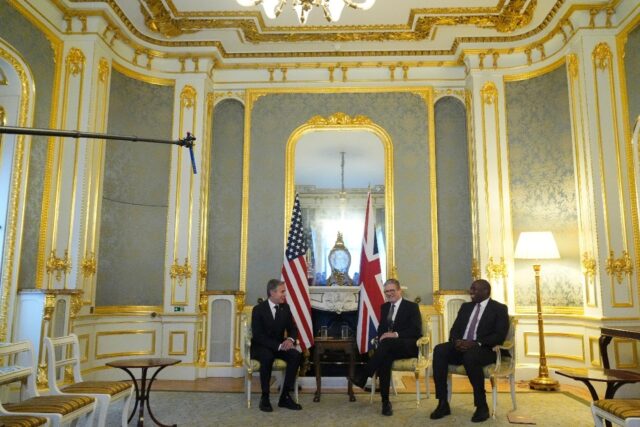The United States and Britain on Wednesday promised a swift review of Ukraine’s requests to ease restrictions on attacking inside Russia as they promised $1.5 billion in new aid ahead of a potentially difficult winter.
US Secretary of State Antony Blinken and his new British counterpart, David Lammy, showed solidarity with a rare joint visit to Kyiv, which they reached after taking a nine-hour train ride together from Poland.
The trip came amid growing concern over the situation on the battlefield and the uncertain future of Washington’s stance on the war.
Russia’s alleged acquisition of new short-range Iranian missiles threatens to ramp up Moscow’s firepower, while November’s US presidential election could result in a dramatic shift by Ukraine’s top backer.
Blinken said the United States would offer $717 million in fresh economic aid to Ukraine — half of it to support an electricity infrastructure that has been battered by Russian strikes as winter approaches.
Blinken accused Russian President Vladimir Putin of dusting off “his winter playbook” to “weaponise the cold against the Ukrainian people”.
“Our support will not wane, our unity will not break,” Blinken told reporters in Kyiv.
“Putin will not outlast the coalition of countries committed to Ukraine’s success, and he is certainly not going to outlast the Ukrainian people.”
Lammy reiterated his Labour government’s pledge to provide £600 million ($782 million) in economic assistance to Ukraine.
Britain, which has consistently pushed to ease restrictions on Ukraine’s use of weapons, will also provide hundreds of new air-defence missiles to Ukraine this year, he added.
Russian advances
Russia has been advancing on the key logistics hub of Pokrovsk in the eastern Donetsk region, a month after Kyiv launched a shock counter-offensive into Russia’s Kursk region.
In an online post on Wednesday evening, President Volodymyr Zelensky noted that he had had “very substantive” talks with Blinken and Lammy, thanking both countries for their support.
But he added: “It is important that Ukrainian arguments are heard.
“This includes the long-range weapons, the supply of combat brigades on the front lines, and the overall strategy for achieving a just peace.”
Earlier, Foreign Minister Andriy Sybiga told journalists: “It is important to lift any restrictions on the use of US and British weapons against legitimate military targets in Russia.”
Blinken said Washington would look at the requests “with urgency”. They would be discussed on Friday in Washington when US President Joe Biden meets UK Prime Minister Keir Starmer, he said.
Blinken hinted at his personal support, saying that throughout the war “we have adjusted and adapted as needs changed, as the battlefield has changed, and I have no doubt that we’ll continue to do that.”
But Biden, while strongly supportive of Ukraine, has previously made clear he would be careful to avoid a direct conflict between the United States and Russia, the world’s two leading nuclear powers.
‘Appropriate response’
Asked how Moscow would react, Kremlin spokesman Dmitry Peskov said that the response “will be appropriate”, without providing specific details.
Washington said it believed that Russia could start firing short-range Iranian-made missiles into Ukraine within weeks, potentially freeing up Moscow’s long-range arsenal to hit deeper into Ukraine.
The United States earlier this year cleared Ukraine to use Western weapons to hit Russian territory but only when in direct conflict across the border.
Britain has been eager for Biden’s green light to let Ukraine fire long-range Storm Shadow missiles into Russia.
One key request by Ukraine is to loosen restrictions on US-supplied Army Tactical Missile Systems, or ATACMS, which can hit targets up to 300 kilometres (190 miles) away.
Both Republican and Democratic members of the US Congress have pushed Biden to move quickly on the ATACMS issue.
Republicans, however, are deeply divided over Ukraine. A victory in November by Republican presidential candidate Donald Trump over Biden’s political heir Kamala Harris could dramatically shift US policy.
At a debate on Tuesday with Harris, Trump — who in the past has voiced admiration for Putin — notably did not say he wanted Ukraine to win, only that he wanted to end the war quickly.
Blinken — on his fifth trip to Kyiv since the war broke out — again reached outside of official circles, eating at a celebrated borscht restaurant and meeting anti-corruption activists.
Lammy, for his part, told Ukrainians of his own heritage as a black Briton and said Putin has shown “the same arrogance, the same greed” as those who enslaved his ancestors.
“This is imperialism; this is fascism,” Lammy said.

COMMENTS
Please let us know if you're having issues with commenting.